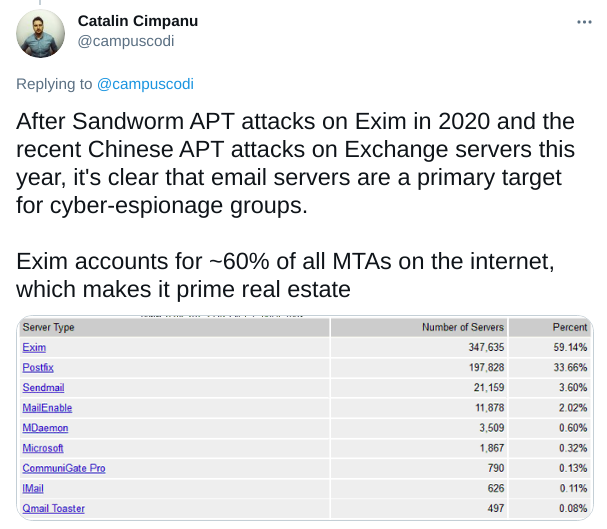Exim-vulns/21 Nails: Qualys discovered multiple severe local and remote vulns in EXIM-MTA, see the Qualys-Advisory.
Patches and updates for distros are available since 2021-04-27
PoC-able code for 10 of these vulns had been released in the advisory as well, so exploitation should be expected in a couple of days. Some of the vulns might be chained for a complete system-takeover.
Since Exim-vulns had been seen in state-sponsored attacks in 2020, we urge you to patch all affected systems
21Nails: Multiple vulnerabilities in Exim
========================================================================
Contents
========================================================================
Summary
Local vulnerabilities
- CVE-2020-28007: Link attack in Exim's log directory
- CVE-2020-28008: Assorted attacks in Exim's spool directory
- CVE-2020-28014: Arbitrary file creation and clobbering
- CVE-2021-27216: Arbitrary file deletion
- CVE-2020-28011: Heap buffer overflow in queue_run()
- CVE-2020-28010: Heap out-of-bounds write in main()
- CVE-2020-28013: Heap buffer overflow in parse_fix_phrase()
- CVE-2020-28016: Heap out-of-bounds write in parse_fix_phrase()
- CVE-2020-28015: New-line injection into spool header file (local)
- CVE-2020-28012: Missing close-on-exec flag for privileged pipe
- CVE-2020-28009: Integer overflow in get_stdinput()
Remote vulnerabilities
- CVE-2020-28017: Integer overflow in receive_add_recipient()
- CVE-2020-28020: Integer overflow in receive_msg()
- CVE-2020-28023: Out-of-bounds read in smtp_setup_msg()
- CVE-2020-28021: New-line injection into spool header file (remote)
- CVE-2020-28022: Heap out-of-bounds read and write in extract_option()
- CVE-2020-28026: Line truncation and injection in spool_read_header()
- CVE-2020-28019: Failure to reset function pointer after BDAT error
- CVE-2020-28024: Heap buffer underflow in smtp_ungetc()
- CVE-2020-28018: Use-after-free in tls-openssl.c
- CVE-2020-28025: Heap out-of-bounds read in pdkim_finish_bodyhash()

Fragen? Kontakt: info@zero.bs
